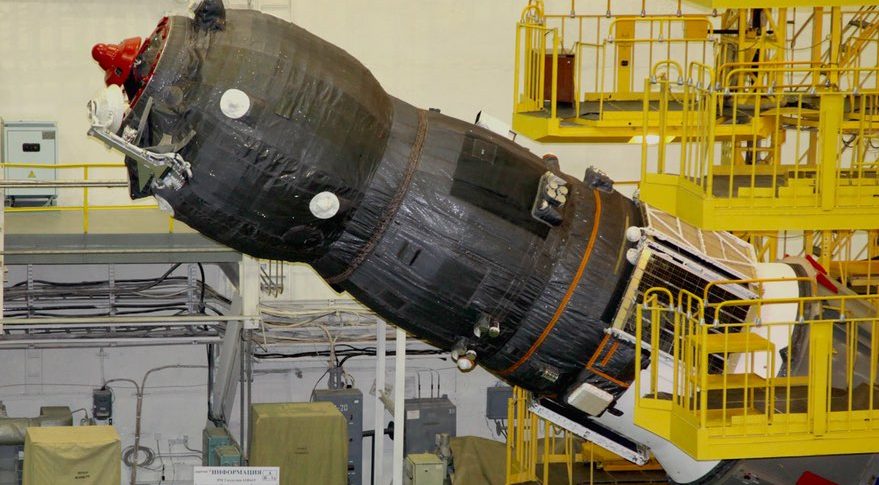Russia Plans Early February Progress Return to Flight

The Progress MS-04 spacecraft was lost during a Dec. 1 launch to the International Space Station when the spacecraft prematurely separated from the Soyuz rocket's upper stage.
Russian industry sources say the next Progress mission, Progress MS-05, is currently scheduled for Feb. 2, provided an investigation into the failure is completed by the end of the month. [Sputnik]
More News
Two Chinese remote sensing satellites launched Tuesday night are in the wrong orbit. Tracking data from the U.S. Air Force show that the two SuperView satellites launched on a Long March 2D are in elliptical orbits ranging from 214 to 524 kilometers, rather than the planned circular sun-synchronous orbits, apparently because of a problem with the launch vehicle. Neither the Chinese government nor Siwei Star Co. Ltd., the company that owns the two satellites, have formally commented on the incident. The satellites have onboard propulsion that may allow them to raise their orbits, but at some cost to their lifetime. The Long March also carried a student-built smallsat deposited into the improper orbit; that spacecraft does not have any propulsion. [Spaceflight Now]
The latest delay in the Proton launch of EchoStar 21 is not related to an earlier problem with the rocket. International Launch Services confirmed Wednesday that the launch, planned for this week, has been delayed, but offered no information on the reason for the delay or when the launch would be rescheduled. ILS did state that the cause of this delay is not related to an engine malfunction during the previous Proton launch in June. [SpaceNews]
NASA officials are urging calm among Earth scientists worried about what the incoming Trump administration might do to their field. At this month's AGU Fall Meeting, scientists expressed concern that the new administration might cut or eliminate entirely NASA's Earth science funding, citing statements by Trump advisors both before and after the election. NASA officials at the conference said they were optimistic that Earth science programs would remain a key part of the agency's science portfolio, and urged scientists to "please be a source of signal, not a source of noise." [SpaceNews]
Breaking space news, the latest updates on rocket launches, skywatching events and more!
NASA's OSIRIS-REx spacecraft performed its first deep space maneuver since its launch in September. The maneuver on Wednesday put the spacecraft on track for a September 2017 Earth flyby, according to NASA, which did not disclose the duration of the engine burn. OSIRIS-REx will arrive at the near Earth asteroid Bennu in 2018 to study the asteroid and collect samples for return to Earth. [NASA]
SpaceX released Wednesday the first photo of hardware for its Falcon Heavy rocket. The image, posted on the company's Instagram account, shows the interstage section that connects the first stage core booster with the rocket's second stage, and is similar to the interstage flown on the Falcon 9. The company has not disclosed a specific launch date for the long-delayed inaugural flight of the Falcon Heavy other than some time in the first half of 2017. [Ars Technica]
President-elect Donald Trump cited satellite broadband company OneWeb's plans to hire 3,000 people Wednesday. Trump mentioned those jobs, enabled by a $1.2 billion funding round earlier this month led by Japanese company SoftBank, along with 5,000 jobs Sprint is moving back to the U.S. as part of "the spirit and the hope" after his election. SoftBank, which owns 80 percent of Sprint, had pledged to Trump earlier this month to invest $50 billion in the U.S. and create 50,000 jobs. OneWeb executives said last week that discussions with SoftBank started a few months ago, prior to both the election and SoftBank's later pledge to Trump. [CNBC]
Trump, meanwhile, reportedly has shown an interest in the moon. Historian Douglas Brinkley met with Trump on Wednesday and told reporters after the meeting that the president-elect was "was very interested in a man going to the moon and the moon shot." It wasn't clear if that interest was in past lunar exploration or any plans for the future. [Washington Examiner]
This story was provided by SpaceNews, dedicated to covering all aspects of the space industry.

Jeff Foust is a Senior Staff Writer at SpaceNews, a space industry news magazine and website, where he writes about space policy, commercial spaceflight and other aerospace industry topics. Jeff has a Ph.D. in planetary sciences from the Massachusetts Institute of Technology and earned a bachelor's degree in geophysics and planetary science from the California Institute of Technology. You can see Jeff's latest projects by following him on Twitter.

